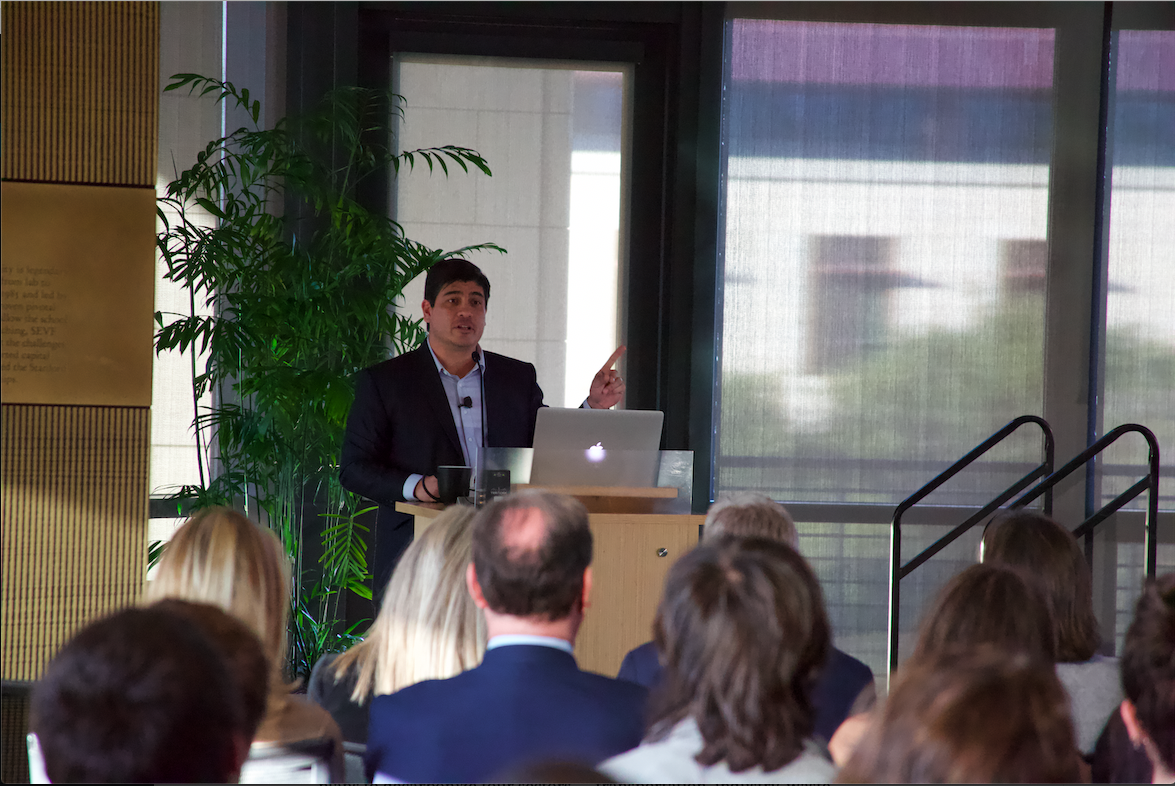“It’s the right thing to do, and we must all do it,” said President Carlos Alvarado Quesada of Costa Rica on his country’s commitment to decarbonization and environmental investment.
On the second day of his campus visit, Alvarado addressed a packed room at the Jen-Hsun Huang Engineering Center, where he discussed his plan to decarbonize Costa Rica by 2050, making the country effectively 100 percent reliant on renewable energy sources.
“We are the herd of a beautiful tradition of innovation and change,” said Alvarado, the 48th President of Costa Rica.
In a 30 minute lecture Wednesday evening, the President explained his plans to decarbonize four sectors — transportation, industry, waste management and agriculture — with transportation as one of his largest areas of focus. The “big building block,” as he described, is the fact fossil fuels comprise 70 percent of the country’s energy usage, while the transportation sector heavily relies on carbon-emitting fuel sources. The other 30 percent of energy use comes from electricity.
Costa Rica generates 99 percent of its electricity from a variety of renewable sources, including 78 percent from hydropower and 20 percent from wind and geothermal energy, according to the Costa Rican Institute of Electricity.
Just over 10 months into office, Alvarado has set forth a plan that tackles the issue from multiple fronts, including increased sustainable mobility and public transportation, efficient freight transportation and a zero emissions vehicle fleet.
“One of the greatest opportunities we have is to plug our electric grid into our production of transportation,” said Alvarado, who plans to introduce two electric trains under his administration.
His initiatives seek to reduce the country’s total greenhouse gas emissions, which reached a record-high of 12,000 kilotons in 2012. The United States, however, emitted 12 million kilotons the same year, according to World Bank data.
“We started decarbonization two decades ago even when we were not aware that it was a concept,” said Alvarado, referring to contributions from his parent’s generation, including the creation of the country’s first electric grid and abolishment of Costa Rica’s military in favor of funding education. He cited these as examples of the country’s attempt to build a more “robust, knowledge-based society.”
His keynote was followed by a panel discussion with Gretchen Daily, co-founder and director of Stanford’s Natural Capital Project (NatCap), and Chris Field, Director of the Stanford Woods Institute for the Environment.
NatCap works with Costa Rica’s Central Bank and several ministries to promote and support sustainable development plans. The team also holds partnerships with the Chinese Academy of Sciences, the University of Minnesota, the Stockholm Resilience Centre, The Nature Conservancy and the World Wildlife Fund.
The Stanford Woods Institute shares a similar vision and purpose, serving as “the university’s hub of interdisciplinary environment and sustainability research,” the institute’s website says.
The panel discussion touched on a number of topics, including the President’s visit to Stanford’s Virtual Human Interaction Lab (VHIL) on Tuesday. He was impressed by the lab’s purpose and recent developments, including using virtual reality “to teach people empathy [and] to raise awareness for climate change.”
“What surprised me at Stanford was the vibe,” Alvarado said. “It’s so positive, and I feel a vibe similar to what we have in Costa Rica about the future and how we need to work together.”
Alvarado’s campus visit comes in the middle of a week-long trip to technology centers throughout the west coast. The President arrived in the U.S. on Sunday and is scheduled to return to Costa Rica on Friday.
According to Alvarado, some of his goals this week were to meet with companies that have important operations in Costa Rica, including Amazon, Microsoft, Intel and Hewlett-Packard. The President also aimed to increase connections with Stanford academia, as well as connect with the Costa Rican community at the various technology companies he visited.
“We want to build this high skilled cluster not only to provide services to these companies but to develop research and new developments,” Alvarado said.
Contact Alejandro Salinas at asalinas ‘at’ stanford.edu.
